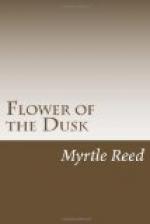Could not the God who ordained the beginning be safely trusted with the end? Forgetting the grey mists of dawn in which the rainbow began, should we deny the inevitable night when the arc bends down at the other end of the world? Having seen so much of the perfect curve, could we not believe in the circle? And should we not remember that the rainbow itself was a signal and a promise that there should be no more sea? Even so, was not this mortal life of ours, tempered as it is by sorrow and tears, a further promise that, when the circle was completed, there should be no more death?
[Sidenote: God’s Love]
The deep voice went on, even more tenderly, to speak of God; not of His power, but of His purpose, not of His justice, but His forgiveness, not of His vengeance, but of His love. A love so vast and far-reaching that there is no place where it is not; it enfolds not only our little world, poised in infinite space like a mote in a sunbeam, but all the shining, rolling worlds beyond. Every star that rises within our sight and all the million stars beyond, in misty distances so great as to be incomprehensible, are guided and surrounded by this same love. It is impossible to conceive of a place where it is not—even in the midst of pain, poverty, suffering, and death, God’s love is there also. The minister pleaded with those who listened to him to lean wholly upon this all-sustaining, all-forgiving love; to believe that it sheltered both the living and the dead, and to trust, simply, as a little child.
[Sidenote: At the Close of the Service]
In the stillness that followed, Eloise went to the piano. The worn strings answered softly as her fingers touched the keys. In her full, low contralto she sang, to an exquisite melody:
“When I am dead, my
dearest,
Sing no sad songs for me;
Plant thou no roses at my head,
Nor shady cypress tree;
Be the green grass above me
With showers and dewdrops wet;
And if thou wilt, remember,
And if thou wilt, forget.
“I shall not see the
shadows,
I shall not feel the rain;
I shall not hear the nightingale
Sing on, as if in pain:
And dreaming through the twilight
That doth not rise nor set,
Haply I may remember,
And haply may forget.”
The deep, manly voice followed with a benediction, then the little group of neighbours and friends went out with hushed and reverent step, into the golden Autumn afternoon. Miriam came in, to all outward appearance wholly unmoved. She stood by him for a moment, then turned away.
Eloise closed the door and Roger and Allan brought Barbara in. She bent down to her father, who lay so quietly, with a smile of heavenly peace upon his lips, and her tears rained upon his face. “Good-bye, dear Daddy,” she sobbed. “It is Barbara who kisses you now.”
* * * * *
When Ambrose North went out of his door for the last time, on his way to rest beside his beloved Constance until God should summon them both, Roger stayed behind, with Barbara. Doctor Conrad had said, positively, that she must not go, and, as always, she obeyed.




